Southwest Airlines Chief Operating Officer walked through where they’re at revamping the carrier’s business model – and the changes that are coming next – on this week’s Airlines Confidential.
He admits that the mood at headquarters “between February and June” was sour, “people were not the happiest.” I certainly heard that from the Southwest executives I spoke to in the spring. However Watterson claims that things turned around over the summer.
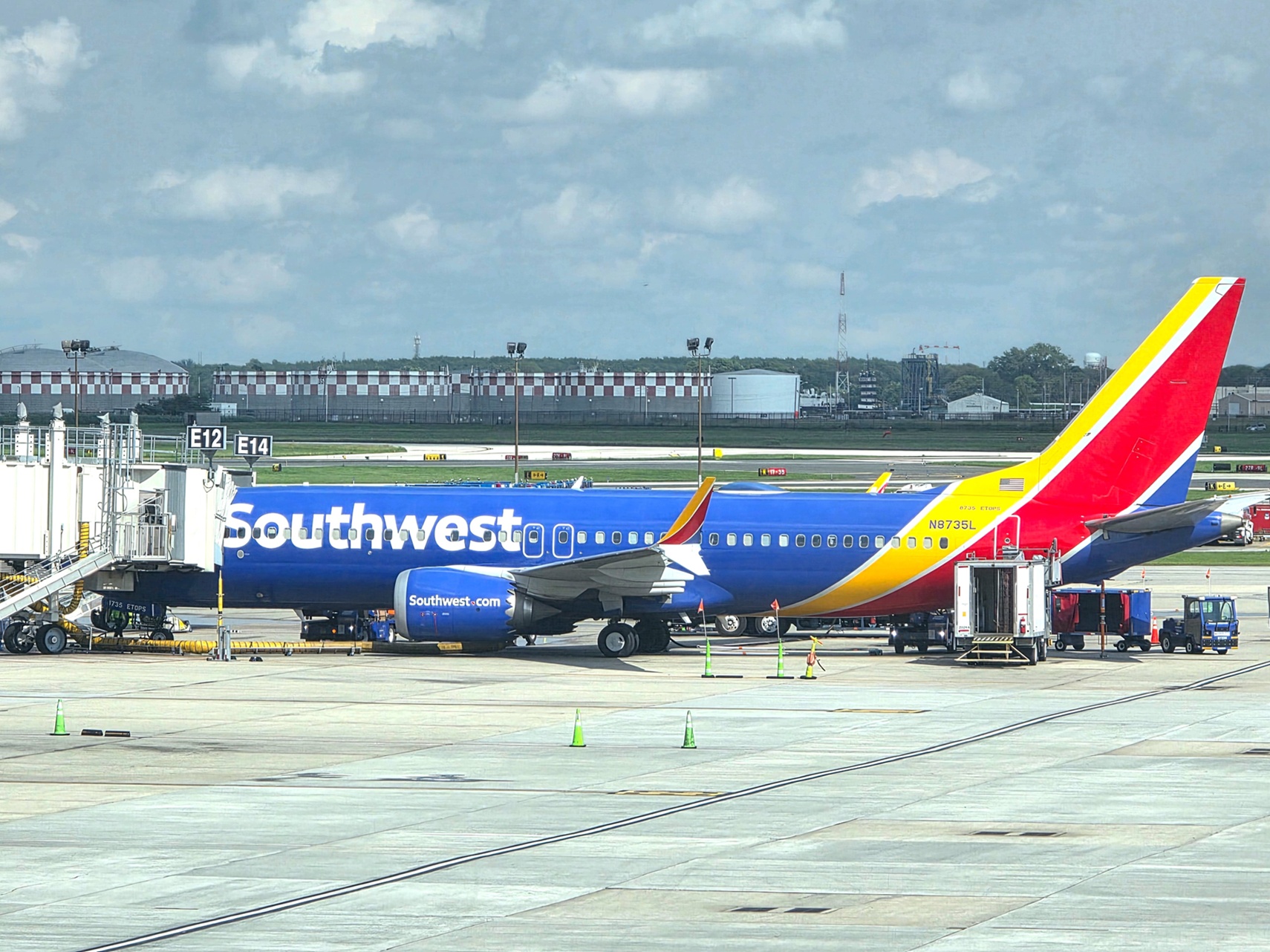
His narrative for Southwest isn’t that they’re ‘becoming just like everyone else’ but rather that they’ve changed their positioning and gone back to their roots.
- They emphasized customer-friendly policies for 15 years “too much.”
- Before that, they had “unique service”
- Now they “are rotating back towards unique services rather than unique policies.”
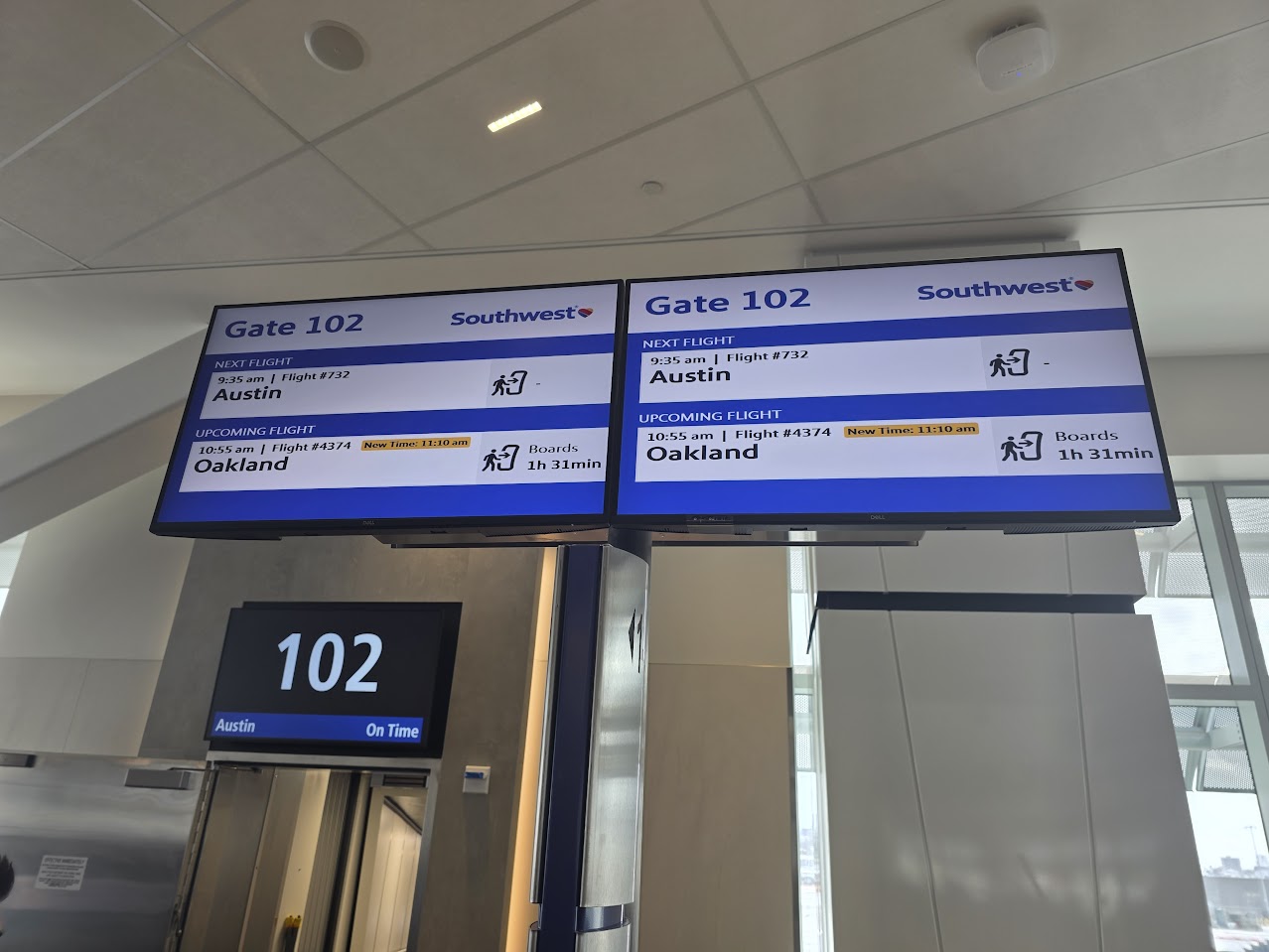
The airline has been really good at people selection. Their front line staff have long seemed to actually like their jobs. And that’s been a real differentiator, in addition to not charging separately for bags and seats and not expiring travel credits. (In fairness, the recent devaluation of Southwest Rapid Rewards is just the latest in a long line of devaluation, with the points having lost 43% in the previous 12 years.)
The airline will unveil a “new positioning” next year. And in the meantime they’ve tried to put out good stories like free wifi and new coffee. And, as they reported during their earnings call, net promoter score has recovered – though this is among current customers which may not be the same as their previous customers.
Watterson concludes, “we have succeeded in shifting the narrative. I can read the social comments now without feeling shameful.”
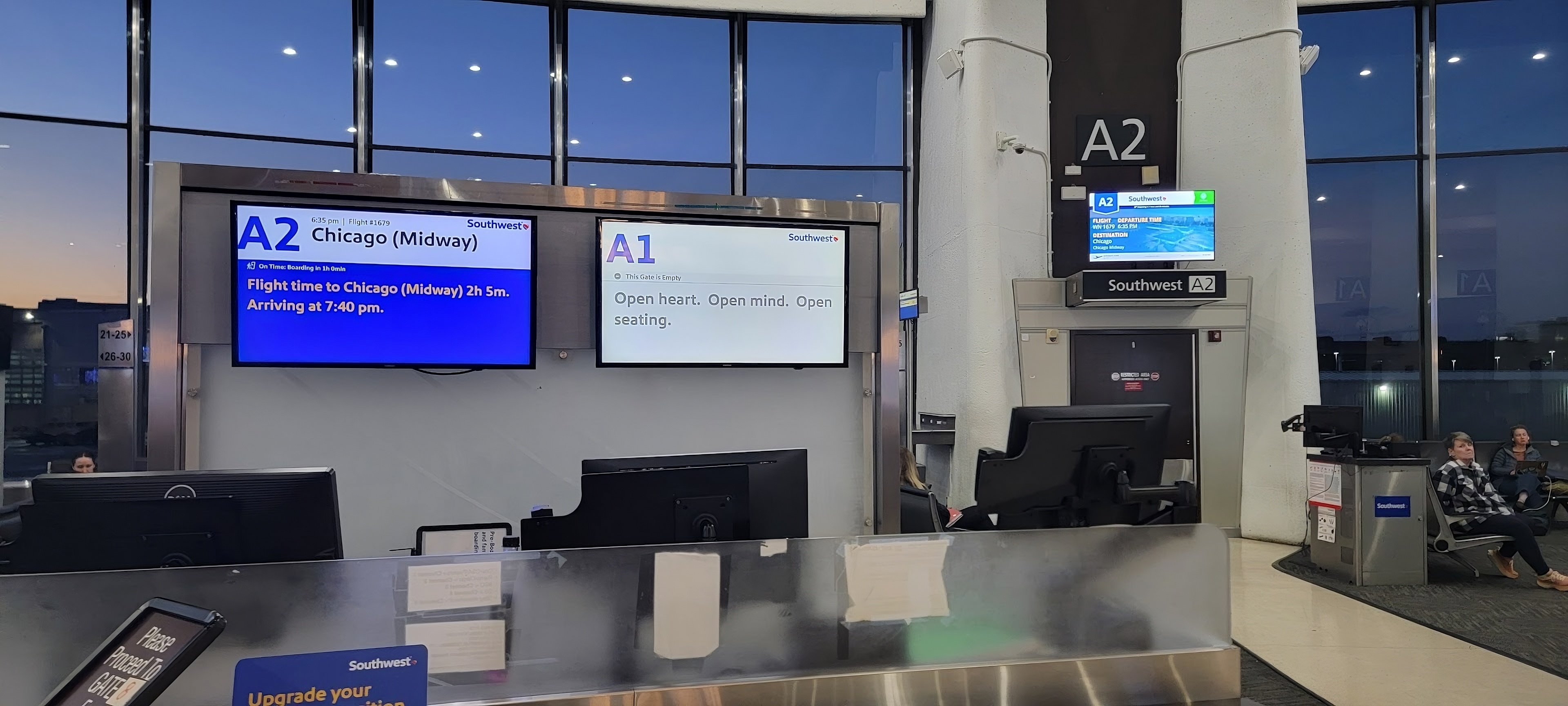
So why all the changes, besides ‘activist investor Elliott Management demanded them’?
- The customers changed. Southwest’s value proposition before the pandemic was flexibility. They didn’t assign seats, so last minute business travelers would still get a good seat. Now road warriors don’t fly as often, so they don’t have as many people willing to buy last minute tickets (or buy up to A1-15 boarding), paying a premium for flexibility.
[I]f you look at what I might call our value proposition to customers, it was really about flexibility. And a large portion of our customers pre-pandemic were business travelers, a third to 40% depending on how you measure it. And they really valued the flexibility. They could move around. They didn’t know where they were going to sit, but they knew they’d get a good seat because they were bored between A and B. We were all about flexibility, including our commercials accentuated that. Post-pandemic, we still have as many or more road warrior business travelers, but they travel less per person. And that ends up being more consequential than you may see at first glance, because then who paid for that flexibility were business travelers. And so with less business travelers, we could not stretch our revenue to cover the increased costs we saw and everyone else did pre-pandemic. And so we had to go to a more segmented, pay more to get more value profits, just like a lot of other airlines.
Watterson is saying the customers changed, and so their bet that bag fees would be net negative for revenue is wrong. But now that they claim they’re generating the bag fees to expectation the financials don’t look like they’re generating net revenue. And too many price sensitive leisure travelers is an odd problem to respond with ‘charge customers more to profit’.
- Customers weren’t choosing Southwest for free bags on Google Flights. This is an important point but a misleading one. He said that when people saw they’d get free checked bags, they still didn’t choose Southwest, so why give free checked bags?
And at the time, we’d also gone live in Google Flights, which was another one of the things we did. And Google Flights had a bag indicator. It showed free check bags. We saw no benefit. We did not see our Google rankings. We didn’t see our click-through rate change at all. And that helped us get over our fear that we would lose a lot because clearly it was not driving choice.
We were seeing that it was not the choice discriminator that we feared it was. And that’s what helped us get over it and change our mind, which we announced in March of this year.
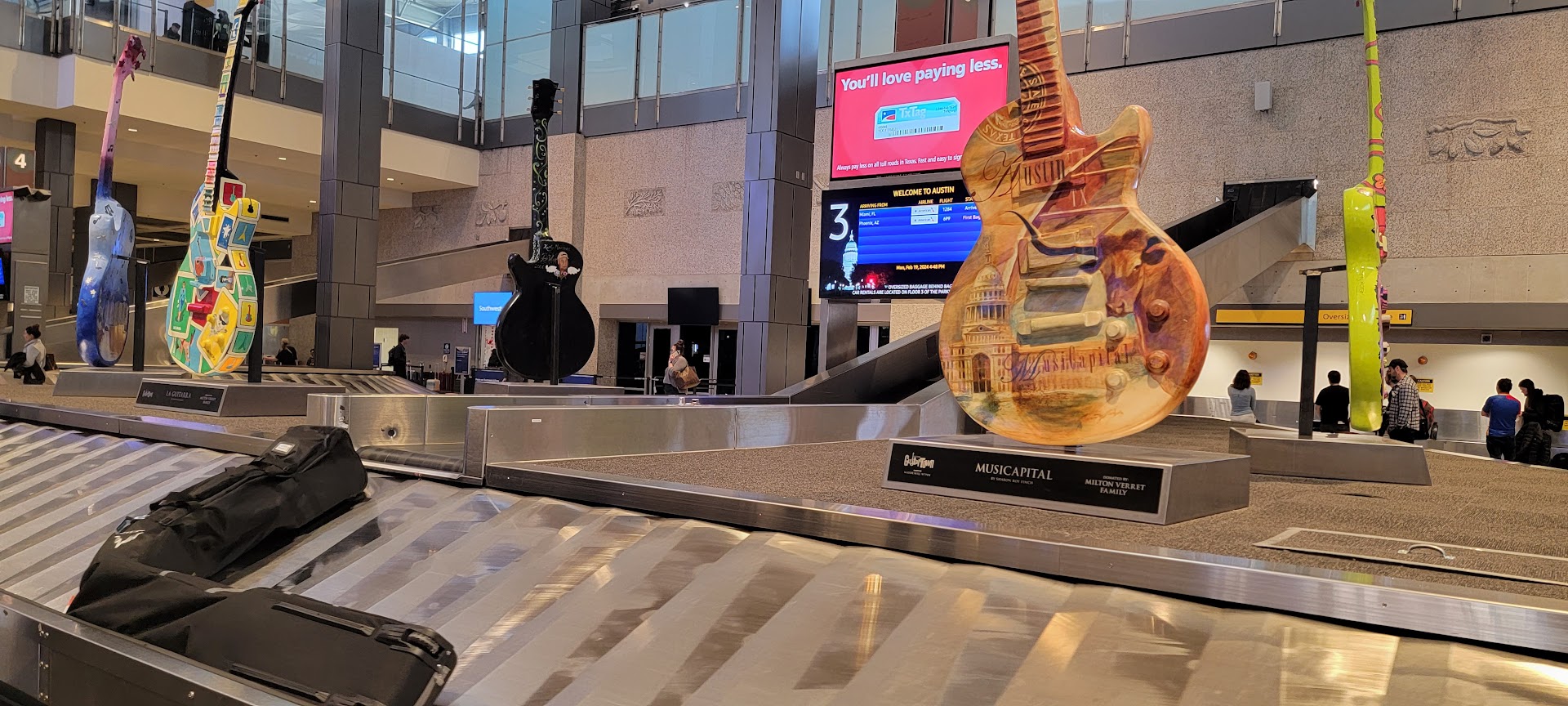
Customers in cities Southwest was small didn’t know to check Southwest’s website for flights, so passengers weren’t evenly split between their major cities like Denver, Phoenix, Houston, Dallas and Chicago and smaller spokes. They got most passengers from their big cities, and had a deficit in the smaller ones. They needed to sell online.
And once they sold online through Google, through Expedia, customers were comparing on price and Southwest was more expensive (their fares weren’t unbundled). So people didn’t choose Southwest. A separate attribute saying ‘ah, but you get bags’ didn’t move the needle.
Since they needed to sell through indirect channels, they had to unbundle to compete with other airlines – going to basic economy, seat fees, bag fees, etc.
The Biden administration had adopted a regulation that would have required fares to be displayed for all airlines inclusive of a set of optional fees, and that would have made Southwest look great on those platforms, but the 5th Circuit Court of Appeals enjoined the rule and the Trump administration dropped it. And that’s why we get checked bag fees.
- They need lounges for the credit card business, and their customers want lounges which is new. Southwest needs lounges because premium credit card customers want lounges. Passengers in lounges used to be “those flying first class.” It wasn’t relevant to Southwest before because they weren’t selling first class.
However, the lounge demographic has changed: “Now it’s people with a credit card flying economy a lot.” They just haven’t announced lounges because “there’s a level of irreversibility here, and they are expensive” so they need to be sure before they pull the trigger, “doesn’t mean we’ll do it, but for all the reasons I just laid out, it’s fairly compelling” and they are talking to Chase about it.
He’s being coy, though, because as I revealed this morning Southwest already has an approved lounge lease at the Honolulu airport.
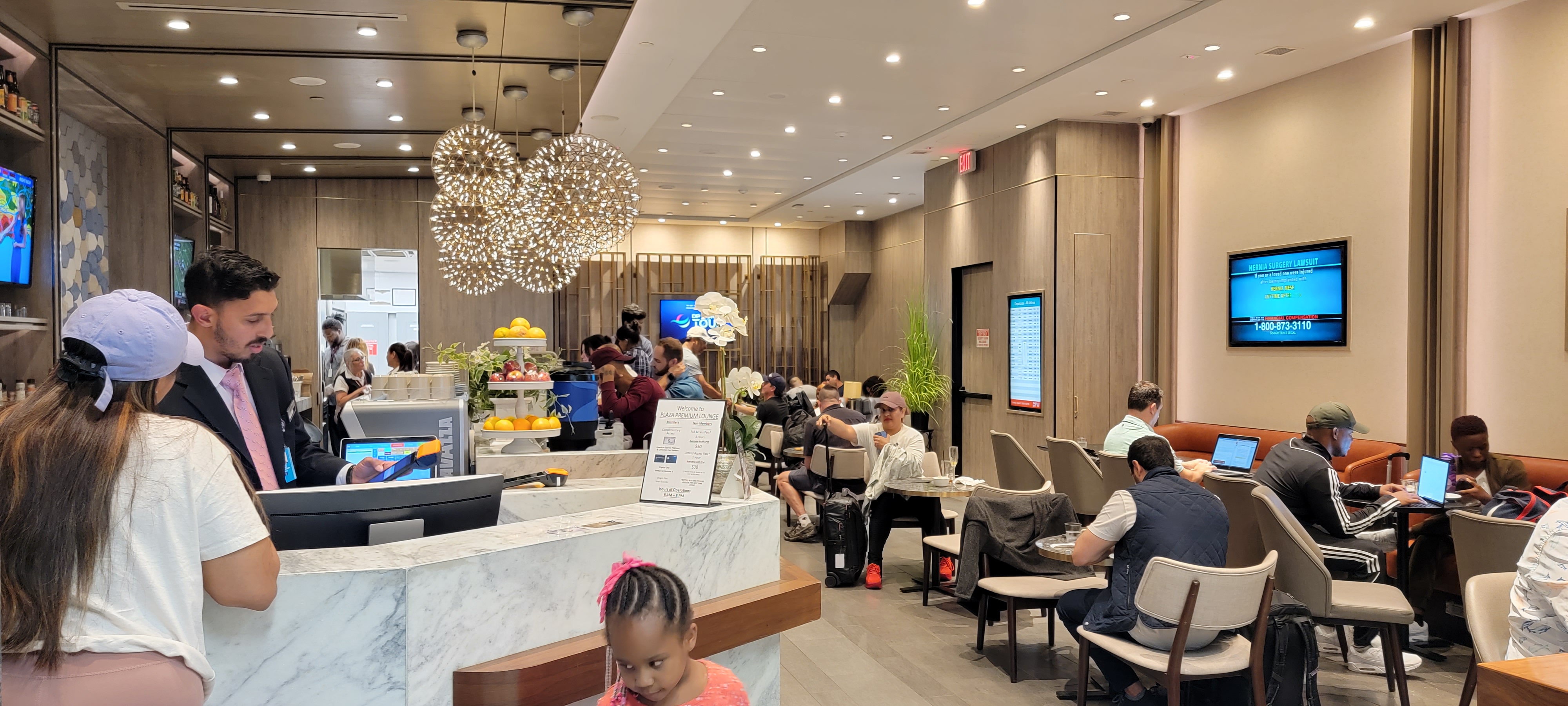
- Elliott did push them to do more, faster. They started with assigned seating, but didn’t want to change everything all at once. But they were underperforming to the board pushed the to move faster and do more things.
We started on that path with assigned seating, but bags, we were fearful that because we’d stick so much on it, it would be a negative. Well, some of our new board members, Elliott, other investors, kind of pressed us on, like, go faster. Your plan is a three-year plan. That takes too long, given you’ve already been underperforming. … So we needed to move faster. We needed the money. It could come from bag fees.
…As to what Elliott has been, I think a good forcing mechanism for us, bringing pressure along with other big investors, it wasn’t just them, to move faster. Southwest, one of our criticisms of us that was valid was we were very deliberate, slow, we should move with more pace. And the external pressure, I think, was helpful in that regard. And they’ve been nothing but constructive since the standstill agreement was signed for moving forward.
So I actually feel much more comfortable talking to Elliott than somebody who’s kind of in and out of our stock as a hot stock. So I think it’s been a constructive relationship. was a really rough and tumble courtship, let’s call it. But that’s the activist world, and when you underperform, you open yourself up to activists. So fully understand that, and our job is to perform.
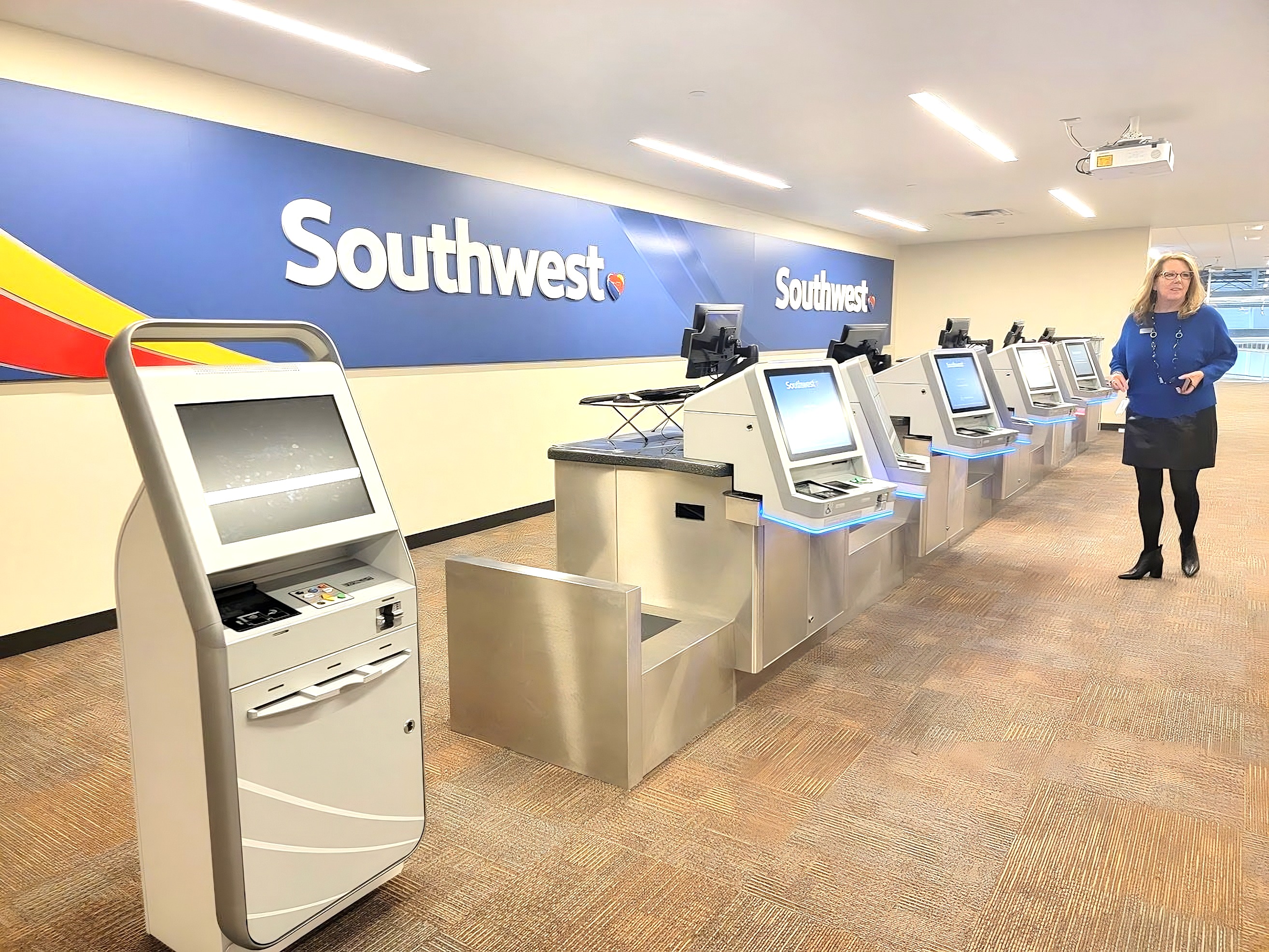
- Customers like seat fees and it shocked them. Instead of feeling nickel and dimed people preferred to pay for the certainty of the seat they want.
Maybe there was a period when it first started that it felt like nickel and diming, but when we were doing our research, it clearly had become a case of people like, I want that seat, I will pay you for it, and I’m pissed if you don’t sell it to me. And so it really flipped. And so customers are really happy about being able to buy the seat they want, which is not necessarily what I expected. And as I mentioned on the earnings call, we see a knife-edge switch in performance the day of assigned seats going live. So it’s clear people are voting with their wallet, that they prefer that method.
- More big changes are coming. Southwest is done with “implementation of the current transformation” and there’s a “next phase, which are bigger stuff… more consequential, bigger, you know, bigger decisions, if you will, than the ones we just took.”
That presumably means more new aircraft types that can fly long haul, first class, lounges – ways in which Southwest copies the rest of the industry even further. But if you believe the old model of a single aircraft type is maxed out (they can’t fly to smaller cities with a 737, bringing traffic to hubs and connecting to other small cities, and they can’t fly long haul) then they need to do something else in order to grow. And the bet is that what customers want now has really changed.
You know, what Bob has been talking about is, you know, the lounges topic, more premium domestically, trans-oceanic service. These are things that our customers want.
And, you know, pre-pandemic, they may have been more nice to have. Post-pandemic, they clearly are something that customers demand. And if we were talking in 23, I may have been like, will this last? Who knows? We’ve seen this movie before, lots of these. But we’re a number of years into it.
And so customers appear to really have changed. Sometimes when you say it’s different this time, it really is different. And so when we open ourselves up and our strongholds, for customers to split their wallet, literally give a credit card with two airlines, or if we can’t give them what they want, we have a strategic weakness. And so we have to figure out, well, how do we address that strategic weakness that our customer base can be poached, if you will, by somebody offering something we can’t deliver?
Many of Southwest’s changes needed to be made. Not all of them did. But Southwest lost control of the agenda because they were slow and mired in their ways. They didn’t respond to changes in the business environment or customer demand – like wanting to pay more for a better experience, or travel beyond Southwest’s route network. That cost them wallet share – and it cost them credit card business.
They deserved an activist investor, but the truth is that they aren’t ever likely to be valued as the growth business they once were. They exhausted what their old model could do, and adopting the business model of airlines that trade at low multiples isn’t likely to help. It hasn’t so far. As a consumer it’s sad to see a less differentiated market, with fewer choices of products.


He was the sacrificial lamb sent out to do some splainin. He plays his part well.
All this talk of first class on Southwest is getting me hot and bothered. Better start those union renegotiations yesterday, Adam Carlisle. Launching that product in 2029 simply isn’t going to cut it. I reckon they’ve got 18-24 months (tops!) to pull it all off. Very challenging but not impossible.
This is a crock. You talk to any of WN A list and nobody wanted seat fees. If you ask Joe kettle if he wants to pay $40 per seat for his family he would say no as well. And the demand for lounges are an even bigger joke (beyond the people who read this blog).
Clearly he was sent out to lie in order to appease the vultures at Elliott.
They could have adopted mixed fleets, flying to both smaller cities and larger planes for long-haul flights… but they didn’t. Instead they grew in low-yield markets and never solved how to raise the yield in those markets. Those were mistakes, as was being overly cautious in exploring opportunities.
However, if I understand correctly, so far, Elliott has been flat wrong. I’m not referring to share price (that’s a latent proxy for financial performance and I don’t believe the markets are perfect). I’m saying the specific claim here: “So we needed to move faster. We needed the money. It could come from bag fees.” That claim, that bag fees would increase revenue, turns out to have been demonstrably false, as I understand it. And that means Southwest made a mistake by losing this differentiator.
Assigned seating is still up in the air (takes effect in late Jan, IIRC), but because bags weren’t magically profitable, I’m very skeptical that assigned seating will be magically profitable. We’ll see in H1 2026!
Say that aloud: “Mike Hunt is hot and bothered!”
Agreed, Gary, Elliott really screwed-the-pooch on these changes; passengers and workers are not pleased; it’s all good for their personal profits, though, right? Money over people. USA! USA! USA!
Cool story bro…my family and I are still walking away from WN after 30+ years. And while one family won’t break their bottom line, I bet I’m not alone. Their product is no better than AA nowadays (minus the surly flight attendants AA has) and them bowing to a minority owner activist investor shows where their corporate mindset has been the past few years: bottom line first, employees/customers last.
Southwest was always our first choice when flying. No longer.
>”Southwest is done with ‘implementation of the current transformation’ and there’s a “next phase, which are bigger stuff… more consequential, bigger, you know, bigger decisions, if you will, than the ones we just took.'”
Death of the CP is next. Or they will restrict it to people who spend $5K with WN or some such. In the Facebook groups, everyone says when that hits, it’s game over.
WWHS
What would Herb say of this new and “better” Southwest Airlines?
Would he see this changes as good, or that carrier is becoming another American Airlines.
I don’t care who isn’t in favor of seat fees. I’m in favor of them and that’s all that matters. If you’re A-List, you’ll receive an assigned seat, no fee, at booking or at check-in. If you’re Joe Kettle, who cares, because you’re trailer trash and I don’t want you flying with me. Seat fees and the crucifixion of Jetbridge Jesus will make Southwest a great airline again, one that I wouldn’t mind flying like I did years ago.
George Navarini: Herb was Executive Platinum on AA.
@toomanybooks — They’ve gotta be losing money on Companion Pass, so, most definitely, it’ll be gone, soon.
Bob Jordan and maybe a few more of his Corporate Stooges are the Last of the Pre Elliott Era Southwest Airlines Leadership. Total Snakeoli salesman. Close to 17 yr former Southwest Ramp Agent and i will never forgive or forget Bob Jordan and his then Corporate Stooges in Never following up with myself and others over a situation that could have cost one of my former coworkers his life. Collateral Damage in Uncle Bob’s World as well as Gary Kelly, Chris Johnson, Samer Rana, Patrick Gutierrez, Doug Currie, etc and the Corrupt TWU555. My wife who is a current 22 plus yr Southwest Airlines Ramp Agent and she to sees Bob Jordan and Stooges as Phony and Pure Evil human beings. I have a book I will be releasing soon about the darkside of Southwest Airlines and it will include many stories from current and past Southwest Airlines employees and Leadership.
As a Southwest-first flyer, I’m generally annoyed by these changes. As it stands, I accepted what is a lower quality product in economy, even if only slightly so, relative to competitors. You have fewer destinations, especially internationally, and fewer in-seat perks, such as no seatback screens, spottier wifi, and charging availability relatively low compared with some others. But at the end of the day, there really is not *that* much that sets Delta’s economy product, for example, apart from Southwest. From an economy legroom perspective, Southwest actually beat everyone but JetBlue, but I don’t think they marketed that aggressively at all. It did make a difference to me, as someone who is 6 feet tall.
The assigned seating and change to the boarding process are what irks me the most. This was a very positive differentiator for me – it was a far more orderly and efficient boarding process than what you see on any other airline. On Southwest, there is no gate crowding – everyone sorts themselves into boarding order and it moves much more quickly than what I’ve seen on other airlines (Southwest still boards 30 minutes before departure, unlike many of the others). Because there was no fee to check a bag, the overhead bins generally did not fill up without accommodating everyone, so I never had any anxiety that I might not be able to keep my carryon with me. You could pay to assure that you have a preferred seat, via early bird or upgrading to A1-15, in the same way that you could pay for a seat assignment on another airline. Sure, it was not an exact seat assignment, but I basically never found that my preferred seat type was unavailable when paying for priority. And for families, you got complementary seating together by boarding after the A-group, something that will now likely be something that costs families $200 more. Again, a feature that was not aggressively marketed in the era of basic economy on every other airline.
In short, I’m a bit sad to lose the one unique experience in the airline market so that it can be basically the same as everyone else. I’m not sure what the value proposition for loyalty to Southwest is anymore – it’s the same as everyone else, but with fewer destinations available, spottier wifi, fewer onboard amenities, and, to boot, an extra legroom product that does not seem price competitive with the other airlines in the market. Once they eliminate the companion pass – and they will – I’m not sure what the value proposition for holding and, especially, for putting spend on the credit cards is anymore either.
It’s understandable that morale was low, particularly from employees that remember Southwest as being the “great equalizer in the sky.” But then society changed. You pay to board first to find out all the lowlife wheelchair fakers that take seats up towards the front of the cabin and aisle/window seats.
I do think Southwest needs to introduce a proper first class with a proper first class product. Flight attendants will likely be resistant to that change-more work.
What a bunch of hooey. When SW does so poorly they either die or are bought out by one of the others, we’ll see what hooey this is. Sadly, they’ll give this clown a golden parachute.
@O’Hare Is My Second Home — “I’m in favor of them and that’s all that matters.” Class ORD, my dude. Psh.
The “unique service” and “customer friendly policies” ended 15 years ago…when they bought Airtran. Big mistake.
I’ve been trying to book a flight on Southwest for February, and what has usually been on Southwest, and is currently a $600 in literally every other airline, is $1100. And, I have upgrade two levels just for the opportunity to pay for an exit row seat. I have a flight credit that looks low I will ever get to use. Southwest hasn’t just became like every other airline, they have nosedived into “worse” territory. I flew American today, and they were fine. And if “O’Hare is my Second Home” is on board with Southwest, then I for sure want nothing to do with that airline. The people who like them are as shitty as the hedge fund that killed them.
I love Southwest Airlines. I won’t travel with anyone else. I’m glad they’re finally getting the perks we’ve been asking for the last several years.
Are you an ex United guy? Your hatred towards southwest is clear, I’ve never seen a positive article on southwest on your platform, of course the value of this platform speaks for itself, it’s considered garbage, last time I checked you made it official that SWA bought JetBlue….please …
FA Q southwest, if you like AA please keep flying with them, I don’t think anyone wants people like you flying SWA hahahahaha keep flying AA and enjoy the service! Hhahhahahah
Too much of their own Koolaid. I used to fly only Southwest – 90% of the time, yes – I liked the seating and the free bags. I fly American now and Delta. Being the same opens possibilities for me. First class is an option for those of us being fiscally responsible, but since the world are spenders. We just don’t care anymore. Do want you want Southwest, but so will your once loyal customers.